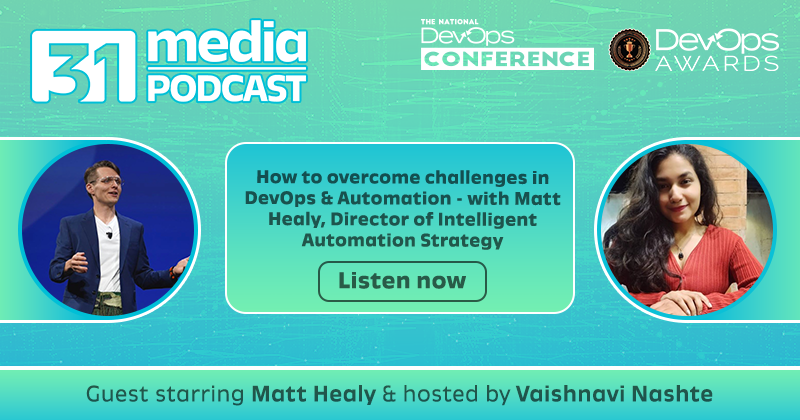In theme with The National DevOps Conference and Awards, we collaborated with Matt Healy, Director of Intelligent Automation Strategy at Pegasystems. In this article he explores how Artificial Intelligence is revolutionising DevOps.
The National DevOps Conference & Awards takes place in London on the 22nd and 23rd of October 2024. To exhibit your products at the event, please get in touch here.
Is AI the end of never ending DevOps transformations?
For almost a decade, I was a release manager for large scale development teams –supporting 1000’s of developers across 100’s of teams working on 10’s of products and initiatives. For that whole decade, my focuses were two-fold, managing the Software Development Life Cycle (SDLC) and improving the SDLC.
Managing and improving the SDLC
The management part consisted of making sure that we were getting secure, high quality, releases out the door on time. In order to support developers, teams, and the overall programme with better and better tools, practices, and processes, the SDLC had to be improved, so the second part of the role.
It was in the ‘improving the SDLC’ aspect which highlighted how DevOps could transform and create a place where big initiatives were planned early and often, enabling teams with full backlogs. User stories could be quickly elaborated on, to ensure that teams cover all considerations, acceptance criteria, standards, and unhappy paths as they plan without taking weeks. As well as ensuring that developers had the tools and knowledge they needed at their fingertips to surface best practices, how-to’s and suggestions for both new and experienced developers.
Further, it is key to make sure that there was healthy automated test coverage, in which developers had the test frameworks and starting points they needed to quickly generate automated tests at every level. Merges and deployments also need to be fully automated. This would enable change to be pushed from a developer’s system through to a pre-production or even production environment with confidence in automated controls around quality, security, and performance. Finally, an aggregated and actionable feedback loop is important across sources like usage analysis, user interviews, and market data, so teams could have insights into how they could improve features and drive adoption.

AI in DevOps: Automating repetitive tasks for efficiency
While we made significant progress against all of these goals, it never felt like we were ‘done’, and we probably never will be. But artificial intelligence (AI) will bring us closer to the DevOps promise land at every stage across the SDLC. The opportunity for AI to help large scale development teams is clear.
AI will offload repetitive manual development tasks, which has already been seen with development efficiency gains in copilot capabilities with AI being able to take a first pass at workflows, integration mapping, user experience components, and more – and this is expected to become even more omnipresent. For developers, AI will put knowledge at their fingertips.
There has already been a rise of AI-driven search, and even now personalised AI tutors who can help developers of all levels get up to productivity fast. Looking at operations more generally, AI will be able to synthesise product optimisation opportunities through analysing historical process mining data to uncover and prioritise the biggest inefficiencies and opportunities for product teams to go after.
Planning with AI: Transforming large-scale initiatives
Working on large-scale initiatives, which involved dozens of teams, and required buy-in from multiple leaders, it felt impossible to get ahead in the planning stage and for this to be optimised. With weeks of meetings, workshops, documents, spreadsheets, roadmaps, architecture diagrams, all to get to a list of user stories which teams could actually start developing, but AI has even started to transform how we plan.
With generative AI, IT teams now have a discovery and planning assistant, which can aid them in evolving legacy assets into future-ready workflows. AI can help across planning stages looking at:
- Level setting: analysing historical analyses and legacy assets like workflow diagrams and user manuals to understand the current state.
- Research: combing through industry expertise to understand the best practices and possible approaches.
- Alignment: capturing all business goals and considerations from across stakeholders and synthesising them into a coherent, all-encompassing vision.
Essentially, generative AI can be the spark to get started. Setting a foundational design for new initiatives which lets teams hit the ground running and collaborate on, fast. Over the past 12 months, great progress has been made with tangible value in some of the toughest-to-manage areas across the SDLC, so we are on the way to the AI promise land – this is just the beginning.
Explore AI and automation at the National DevOps Conference in London
Join us for an in-depth discussion on the scope and future of AI and automation at The National DevOps Conference and Awards, happening in London on October 22nd and 23rd, 2024. This premier event will feature expert insights into how AI is transforming DevOps practices and the broader tech industry.
View the Full Agenda: The National DevOps Conference and Awards Agenda
Exclusive Offer: Gain free entry to the conference by submitting your project to the DevOps Awards before the September 16th deadline. Don’t miss this opportunity to showcase your innovation and network with industry leaders.
For exhibit at the conference, please contact calum.budge@31media.co.uk
Foe media enquiries, please contact vaishnavi.nashte@31media.co.uk


